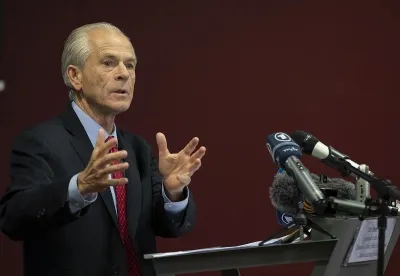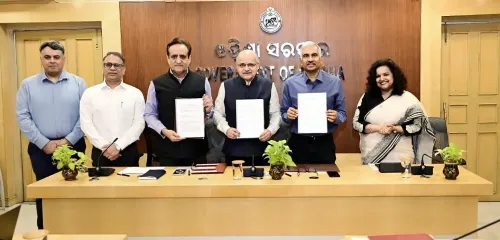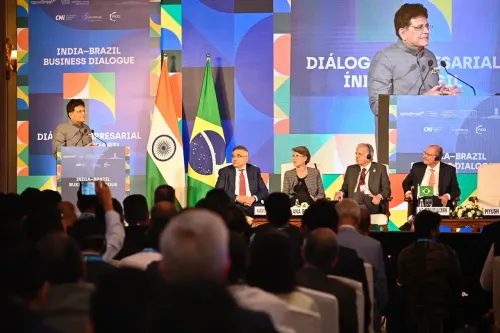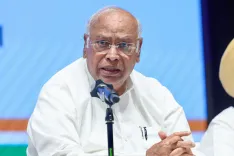Do Peter Navarro’s Claims About India and Russian Oil Hold Any Truth?

Synopsis
Key Takeaways
- India's oil trade helps stabilize global markets.
- Navarro's claims misinterpret the complexities of the oil supply chain.
- India has not financed Russia's military operations.
- Indian refiners operate within legal frameworks.
- Government measures have kept fuel prices stable for citizens.
New Delhi/Washington, Aug 30 (NationPress) Following allegations by Peter Navarro, Senior Counsellor for Trade and Manufacturing at the White House, that India has provided a financial boost to Russian President Vladimir Putin’s military efforts, government officials swiftly dismissed these assertions. They argued that Navarro's perspective stems from an overly simplistic and flawed interpretation of the global oil supply chain.
In a series of posts, Navarro claimed that New Delhi utilizes dollars to procure discounted Russian crude, asserting that while American consumers purchase Indian products, India imposes high tariffs and various non-tariff barriers on U.S. exports.
However, the truth is quite different from what Navarro has articulated on social media.
Navarro remarked on X: “President Trump’s 50% tariffs on Indian imports are now in effect. This is not merely about India’s unfair trade practices—it’s about severing the financial support India has provided to Putin’s military operations.”
This perspective arises from an overly simplistic and erroneous understanding of the global oil supply chain.
According to government sources, it fails to consider the numerous decisions made by G7/EU nations over the past three years, including 18 rounds of price cap sanctions, aimed at regulating the flow of Russian crude oil while maintaining prices below international market levels.
Russia, the world’s second-largest crude oil producer with an output of approximately 9.5 million barrels/day (nearly 10% of global demand), is also the second-largest exporter, sending about 4.5 mb/d of crude and 2.3 mb/d of refined products abroad.
In March 2022, concerns about Russian oil being excluded from the market led to a spike in Brent crude prices, reaching $137 per barrel. Should India halt its purchases of Russian crude oil, global crude prices could soar to over $200 per barrel for all consumers.
Government sources emphasized that India has not provided any financial support to Putin’s military. In reality, India has extended a financial lifeline to global citizens by ensuring oil availability, stabilizing prices, and avoiding “war profiteering” by any nation.
Who has benefitted from India’s role? Primarily the West. U.S. Treasury Secretary Janet Yellen stated that America is content with India’s purchases, while Ambassador Eric Garcetti acknowledged that India has helped avert a price spike. Geoffrey Pyatt referred to India as a crucial stabilizer.
In another post on X, Navarro asserted, “Here’s how the India-Russia oil mathematics works: American consumers buy Indian goods while India excludes U.S. exports through high tariffs and non-tariff barriers. India uses our dollars to buy discounted Russian crude.”
Yet, Indian refiners do not utilize U.S. dollars to transact for Russian oil. Purchases are conducted through third-party traders, and transactions are settled in alternative currencies such as AED rather than the U.S. dollar, according to sources.
After the onset of the Russia-Ukraine conflict, India was encouraged by Western nations to acquire Russian crude, as excluding the second-largest producer, which accounts for 10% of global production, from the market would have led to crude prices soaring to $200 per barrel.
This is why Russian oil has never been sanctioned by the U.S./EU/G7, but rather subjected to a G7/EU price cap mechanism. India’s crude purchases from Russia have remained legitimate and compliant with all international standards, including the price cap.
At no point has the U.S. administration communicated to India—either directly or through diplomatic channels—to cease purchases of Russian crude oil. The government sources noted that rash statements have surfaced on social media and in press articles when trade negotiations did not unfold as desired by the U.S. administration.
Navarro claims that Indian refiners, along with their discreet Russian partners, refine and sell black-market oil for substantial profits on the international stage, while Russia receives hard currency to finance its war against Ukraine. This assertion is also erroneous.
Unlike Iranian and Venezuelan oil, which are sanctioned and not purchased by Indian oil PSUs, Russian oil has never been sanctioned by the U.S./EU/G7.
Russian oil has been subjected to a G7/EU price cap mechanism intended to curb “war profiteering” while ensuring the continuity of global supplies.
“If the United States genuinely aimed to halt the flow of Russian oil, it should have sanctioned Russian crude. The apprehension regarding soaring prices may have restrained the U.S. from doing so. Additionally, India has refrained from acquiring LNG and LPG from any sanctioned projects from Russia,” sources indicated.
In fact, the 18th package of EU sanctions has rendered Nayara Energy, a 20 MMTPA refinery, completely reliant on Russian oil. What used to be 60-65% of its crude intake from Russia has now escalated to 100%.
Navarro asserts that prior to Russia’s invasion of Ukraine, Russian oil constituted less than 1% of India’s imports. Today, it exceeds 30%—more than 1.5 million barrels per day. This increase is not driven by domestic demand; “it's propelled by Indian profiteers and entails an added moral cost due to the devastation in Ukraine.”
In reality, India has been the sole major economy globally to reduce petrol and diesel prices following the Russia-Ukraine crisis in May 2022. During the price surge to $137 per barrel in March 2022, it was crucial to prevent price hikes for 1.4 billion citizens in India. Consequently, the Indian government undertook several measures: Oil PSUs refrained from increasing prices, absorbing a net cash loss of up to Rs 10/litre in diesel (despite discounts on Russian crude). The cumulative loss from April 22 to January 23 for three oil PSUs amounted to Rs 21,000 crore (approximately $2.5 billion).
As private refiners identified an opportunity to export rather than sell in the domestic market, an export tax was imposed to prevent excessive profits. New regulations were established mandating that oil companies exporting petrol sell at least 50% of the quantity sold overseas in the domestic market for the fiscal year ending March 31, 2023. For diesel, this requirement was set at 30% of the exported volume. This ensured a steady supply of fuel, preventing any retail outlets from running dry.
The government, along with several state governments, reduced taxes by Rs 10 per litre in May 2022.
These decisive actions illustrate India’s commitment to its citizens during a period of global upheaval, reflecting the true essence of democracy rather than serving the interests of oligarchs or vested parties.
Without this intervention, global oil prices could have surpassed the March 2022 peak, potentially reaching $200 per barrel and further exacerbating inflation worldwide, sources indicated.
They also stated that India has not sold any discounted Russian crude to any other nation. Instead, it has refined a portion of the Russian crude (alongside hundreds of grades of other global crudes) into petroleum products, most of which have been utilized for its citizens.
The process of refining crude and exporting fuels is integral to the functioning of the global supply chain. Following the ban on Russian crude, Europe has depended on Indian diesel and jet fuel. This is not money laundering; it is a method of stabilizing markets, and claims regarding excessive profits by refining entities are greatly exaggerated.
Navarro’s assertion that while the United States funds military support for Ukraine, India finances Russia, all while imposing some of the world’s highest tariffs on U.S. goods—thereby penalizing American exporters and creating a $50 billion trade deficit with India—is also unfounded.
“This argument is baseless. The U.S. has trade deficits with countries like China, the EU, and Mexico. India’s $50 billion deficit is relatively minor. Meanwhile, India continues to purchase billions in U.S. goods, including aircraft, LNG, defense equipment, and technology,” sources noted.









